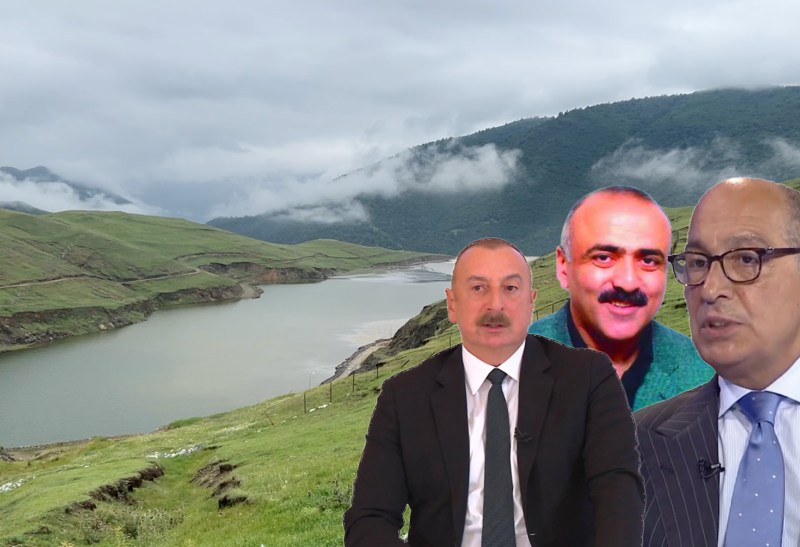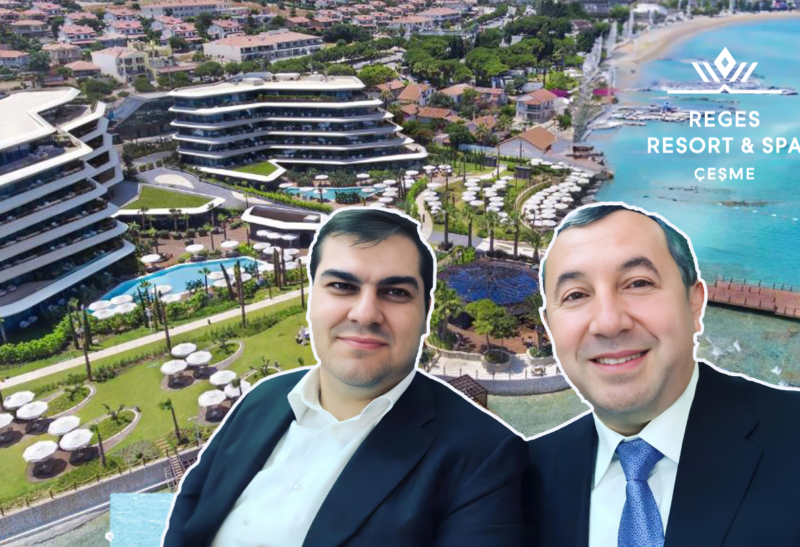by Paul Radu, Khadija Ismayilova,Tamas Bodoky (Atlatszo.hu), and Leyla Avshar
(This article was
published
by OCCRP as part of the
Azerbaijani Laundromat
investigation.)
The Azerbaijani Laundromat was a money-laundering scheme and slush fund used by Azerbaijani elites to disguise the origin of billions of dollars, purchase goods and services, and make secret payments to companies and individuals in the European Union.
It was also used to directly enrich powerful, well-connected Azerbaijani politicians. This is aptly illustrated by the case of Yaqub Eyyubov – one of the country’s most powerful officials – and his family.
Leaked banking records indicate that Eyyubov, who is Azerbaijan’s first deputy prime-minister, used a shell company at the heart of the Azerbaijani Laundromat to pay medical bills worth tens of thousands of dollars.
At the same time, a bank account in Budapest belonging to one of his sons was receiving millions through the Laundromat.
Some of the money for these payments came from another series of covert transactions, also revealed in the banking records, that were made by Russia’s main weapons export company, the state-owned Rosoboronexport. Why these payments were made are unclear.
Yaqub Eyyubov is one of the most influential politicians in Azerbaijan. While the country’s prime minister must be confirmed by the National Assembly, the first deputy prime minister is appointed directly by the president.
Eyyubov got the job in 2003, when he was assigned to the post by former President Heydar Aliyev, the current president’s father.
Since 2009, he has also been charged with developing the oil-dependent country’s oil and gas strategy. Last year, Russian President Vladimir Putin
awarded
Eyyubov the Order of Friendship for his contribution to the development of friendly relations between Russia and Azerbaijan.
The Medical “Concierge”
Along with other members of his family, including his son Emin, who is
Azerbaijan’s Ambassador to the Council of Europe
, Eyyubov used Azerbaijani Laundromat money to pay medical bills in Germany and the United States.
On Oct. 11, 2012, Metastar Invest LLP, one of the four core companies known to make up the Laundromat, paid $178.33 to Johns Hopkins Medicine, one of the best hospitals in the United States, in his name. (On the same day, Metastar sent tens of thousands of dollars to Kalin Mitrev, the husband of UNESCO’s director general, and Eduard Lintner, a former German member of parliament.) (See:
The Influence Machine
)
All in all, Metastar made five payments totaling $12,151 to Johns Hopkins between September 2012 and August 2013 – all in the names of Emin and Yaqub Eyyubov.
Metastar made similar payments in Germany. In Sept. 2012, three small payments in the total amount of €869.95 ($1,094) were made to a German dental care provider for two other members of the Eyyubov family: Farhad, another of Yaqub’s sons, who is second deputy chief of Baku’s road police, and Nasrin Eyyubova, Yaqub’s granddaughter. One other payment of $10,500 was made to another German dental company called Privatpraxis für Implantologie, also in September 2012 for Farhad Eyyubov.
In December 2012, Metastar sent a little more than $2,100 for “medication” to a company called Northern Pharmacy for Emin Eyyubov. It also made a payment of $9,000 to Mercedes Europe for Emin and another of almost $1,300 to a medical concierge service in Berlin for Yaqub.
In an emailed response to questions about the payments, Emin Eyyubov told OCCRP and its partners that Metastar had provided “concierge services” to him and his family.
“They were offering their services in many areas, including in arrangement [of] medical treatment worldwide,” he wrote. “Our payments to Metastar [were] done for my treatment at John[s] Hopkins Hospital and for purchasing medication for myself as part of the medical treatment.”
In a separate email to OCCRP partner Berlingske, Emin wrote: “All your allegations that these payments were connected to any kind of illegal activities are groundless. … I personally believe that these are new organized attempts to put pressure on Azerbaijani Government (not regime) and/or cause provocations.”
The Metastar bank records obtained by OCCRP do not indicate the activities of a concierge or medical payments company – or any retail company, for that matter. Metastar makes no payments for rents, supplies, taxes, staff, or any other normal business costs. Rather, besides payments to politicians and for luxury goods, most of its transactions consist of large payments to other offshore companies.
The Hungarian Millions
The banking records, along with documents obtained from the
Panama Papers
databases and from Hungarian archives, show that the Eyyubov family used Metastar for more than just healthcare services. (The Panama Papers were a set of leaked documents from Mossack Fonseca that were obtained by the German newspaper Süddeutsche Zeitung and shared by the International Consortium of Investigative Journalists (ICIJ) with OCCRP.)
In July 2012, Metastar began making a series of payments totaling over $9 million to the Hungarian bank accounts of an equally secretive firm based in the British Virgin Islands called Velasco International Inc.
As it turns out, this firm is also in the Eyyubov family. It belonged to another of Yaqub Eyyubov’s sons, Orkhan Eyyubov.
Velasco had been created by Mossack Fonseca, the infamous law firm at the heart of the Panama Papers, at the request of a Hungarian offshore company formation agency called Laveco.
Email correspondence between Laveco and Mossack Fonseca attests to the secrecy that surrounded the new offshore company. In one email, a Laveco agent asks Mossack Fonseca to send some documents relating to Velasco affixed with a kind of international notarization called an apostille – but without mentioning the company’s shareholder. This request is marked in bold red in the body of the email.
Other records provide additional evidence that Velasco belongs to the Eyyubov family. Documents in the Mossack Fonseca database indicate the address where the company’s records are kept: Suite 20 at 1/A Yusif Safarov Street in Baku.
When an OCCRP reporter visited the address, a security guard confirmed that two apartments on the seventh floor of the building, 19 and 20, are owned by Yaqub Eyyubov. The guard described Eyyubov not as an ordinary minister, but rather as “the president’s minister.”
According to the Panama Papers database, the same address was used by Orkhan Eyyubov to set up two offshore companies using multiple passports and the services of Mossack Fonseca. He has also used a British passport to set up a company in the UK and is recorded as a Canadian resident in the UK companies registry.
The Azerbaijani Laundromat money started flowing into Velasco’s accounts in the summer of 2012. The first transfer of $450,505.78 from Metastar to Velasco was made on July 19, 2012.
The money kept pouring in until August the following year.
All in all, 27 payments totaling over $9 million were made to the Velasco accounts in Hungary and Cyprus. The company was dissolved at the request of its Hungarian formation agency in 2015, and it is not clear where the money ended up.
Part of the money came from Rosoboronexport, Russia’s state-owned weapons intermediary import/exporter company. The company transferred around $29 million into the Metastar accounts in total.
Yaqub Eyyubov did not answer OCCRP’s questions directly, but his son, Emin Eyyubov, who was asked to forward questions to his father told us: “I would like to let you know that I have absolutely no idea that Laveco, Velasco, Mossack Fonseca or Russian company are somehow related to me or my family and even until now I did not know that my family resided at that address in Baku. I have also no idea what these companies are doing or whatsoever. What I only know is that, once again, Metastar provided to me and my family concierge services in arrangement medical treatment in various medical establishments in US and Germany and we paid to Metastar in Baku. I’m not aware what other business Metastar or others are or were involved. Furthermore, I have no information whatsoever in which countries or in which financial institutions Metastar has or had business accounts.”
Aliyev’s Press Secretary and Other High Profile Users
Yaqub Eyyubov was not the only Azerbaijani official who got Azerbaijani laundromat money.
Azer Gasimov, the press secretary of President Ilham Aliyev, received four installments worth $130,400 through the scheme in the first half of 2013. According to the records, the money was “a deposit for educational field trip to United States.”
In October of that year, in a piece for the APA news agency, Gasimov responded to the US State Department’s criticisms of his country’s 2013 presidential elections, which were widely viewed as fraudulent by independent observers.
“I have familiarized myself with the statement issued by the U.S. Department of State on the presidential elections in Azerbaijan,” Gasimov wrote. “I want to say that the non-objective and biased statement of the Department of State is a document not based on reality.”
Gasimov did not respond to OCCRP’s requests for comment on these payments.
Other Azerbaijani officials who got Laundromat money include the former minister of Transportation, Ziya Mammadov, and current and former officials with SOCAR, the state oil company, such as Hamza Karimov and his brother Tural Karimov.
Dozens of other companies and individuals received Laundromat money, including the murdered businessman Rashad Gafarov, academic Sadiyar Zeylanov, and relatives of the deputy chief of Azerbaijan’s anti-corruption directorate, Ali Naghiyev.
Jonny Wrate contributed to this story.
This story is part of the Global Anti-Corruption Consortium, a collaboration started by OCCRP and Transparency International. For more information,
click here
.



